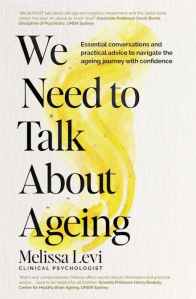In a society that fetishises youth, the prospect of ageing is, at best, daunting. At worst, it’s terrifying. Verging on superstition, society clings to the belief that if we can deny and conceal ageing by focusing solely on youth, relegating the aged to live behind closed doors (often literally), then we can deny ageing itself.
It’s all too easy to put off difficult conversations. In this book, clinical psychologist Melissa Levi makes a really good case for having conversations about ageing early and often.
This book covers what Melissa calls the three trajectories of ageing: successful ageing, normal ageing and compromised ageing. Along the way, she demystifies common reversible and chronic conditions and their treatments, highlighting that even when a condition is not treatable, there are still ways you can manage it.
I found the chapter about carers particularly helpful. Despite rounding out the book discussing the Grim Reaper, this book is surprisingly hopeful. A lot of time is spent providing information and encouraging you to have conversations with your loved ones to ensure older people are given the choices and dignity they deserve.
While readers beginning to think about ageing will find plenty of information, the stories of older people and their families were what I most looked forward to. It’s one thing to read suggestions for managing a condition but being a fly on the wall when people are applying these to their lives makes them feel more doable.
Every so often, I was reminded that I was reading a book written by a clinical psychologist. After telling a loved one you have concerns, the author invites the reader to ask questions, one of which was ‘How does this information align with your experience of how things are going?’ I don’t think I’ve ever heard a sentence like this from anyone other than a psychologist. Thankfully, the majority of the book is written in a down to earth, relatable way.
I lost count of the number of times I was referred to a specific page on the author’s website. Sometimes this is so you can access downloadable versions of information covered in the book, including checklists. Other times, though, such as in the case of sleep hygiene strategies, the only way for you to access this information is to visit the author’s website. I didn’t want to have to consistently stop reading to visit a website. I wanted the book to contain all of the information, as appendices if necessary.
When I visited the author’s website, I discovered that some of the promised information hasn’t been uploaded yet. Granted, the book was published less than two weeks before I read it but after having been annoyed by how many times I was referred to it, I expected the website to be a fount of supplemental knowledge.
There’s an index so you can easily find information about a specific topic and a list of resources (primarily Australian) you can contact for further information or support. The summaries at the end of the chapters are very helpful. I wish I’d had the opportunity to meet Melissa’s Zaida.
I learned that the losses that often come with age (loss of health, memory, friends, roles, independence) was not the loss of joy, the loss of quality of life, or the loss of one’s inextinguishable will to live.
Thank you so much to Hachette Australia for the opportunity to read this book.
Once Upon a Blurb
Do you get the sense that something’s just not quite right with Mum, Grandpa or yourself?
Does your family avoid having the big conversations about ageing?
Are you confused and overwhelmed?
You are not alone.
With over a decade of experience specialising in older people’s mental health and dementia in Australia, clinical psychologist Melissa Levi has helped more than a thousand older people, and their families, navigate the ageing journey. While every family’s story is unique, Melissa has come to know that we all share common fears and questions about ageing – the same questions that her own family had when her grandfather was diagnosed with dementia.
In We Need to Talk About Ageing, Melissa encourages us to understand that while getting older is inevitable, the experience doesn’t need to be overwhelming, or clouded with uncertainty or confusion. Melissa provides expert information on what to expect as you get older, how to identify symptoms of common medical and psychiatric conditions in later life, and, most importantly, what you can do and where to go for help.
Melissa also shares practical strategies, tips and discussion prompts, so you and your family are equipped to have the big conversations about ageing and are empowered to plan for the future. This book will help you to clarify your options, find your way through the aged-care maze, make informed, values-aligned decisions, and ultimately experience greater meaning, joy and connection.
